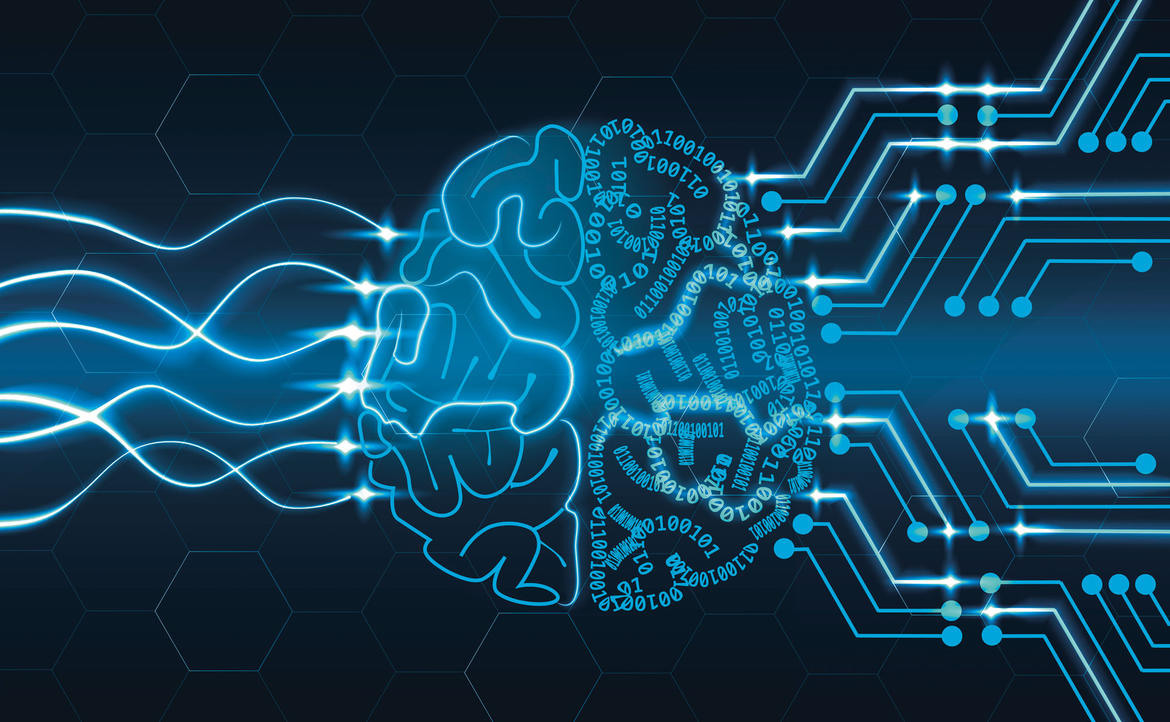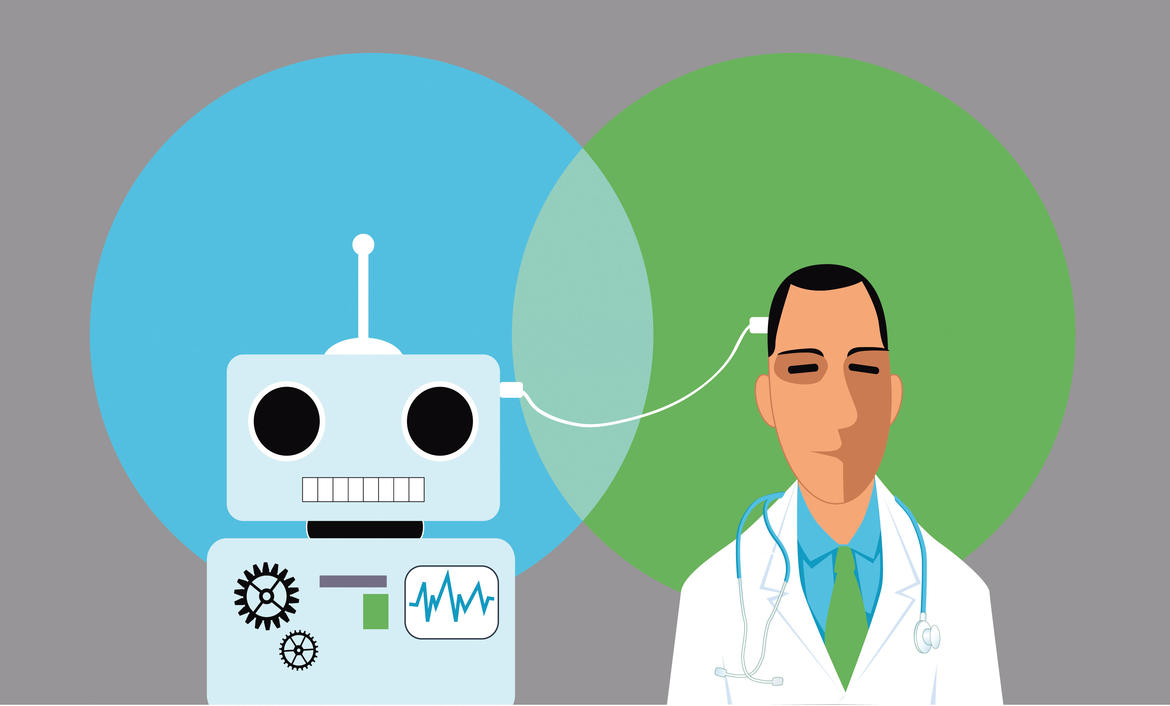Never before have there been as many researchers all over the world working together and collaborating in a single subject area as there are in the area of digitisation. The aim of this collaboration is to transform and digitize all physical data, thereby making it accessible worldwide, at any time and from any place. Digital technologies are currently sweeping across all industries, and the healthcare sector is no exception. Although associated with a lot of benefits, there is also increasing uncertainty amongst users as to the extent to which digital applications and automated decision intelligence can be trusted. However, in order for digital technologies to work, they first have to be developed and trained, which is where artificial intelligence (AI) enters the picture.
What is artificial intelligence?
Artificial intelligence is an umbrella term for a range of technologies and algorithms that resemble processes associated with human intelligence and cognition. The idea behind these technologies is by no means new. The first wave of artificial intelligence swept the world in the 1940s, just after the development of the first computers and after the idea of an artificial brain first emerged. However, the results achieved at that time were sobering and it is only now that, thanks to advances in mathematics, network and computer technologies, we are beginning to see the emergence of AI applications that have genuine benefits. Most of the intelligent solutions currently in use are based on neural networks. That is, networks that simulate the networks in the brain and that can be programmed by humans by supplying them with vast amounts of data. Over the past six years, this area has seen a number of significant breakthroughs such as in image recognition, language analysis and in medical diagnostics and the development of medicines. A pan-European study by PriceWaterhouse Coopers has shown that the use of artificial intelligence could lower healthcare spending by around 200 billion Euros within as little as ten years.

Concerns
The surprising results produced by intelligent systems can easily be perceived as threats as opposed to positive advances. The fact that artificially intelligent systems can do certain types of work for us means that there will inevitably be fewer jobs in future. Although that means that some jobs will completely disappear at some stage, it will also create opportunities for new kinds of jobs. Within that context, the Centre for European Economic Research established that 42 percent of all jobs will be at risk by 2030, primarily because of the increasing use of robots and automated systems in order to lower operating costs. However, these changes will also pave the way for investments in new products and new kinds of jobs. Another aspect that is generating a lot of concern is the data monopolies of large internet service providers and a loss of autonomy. As there are no definitive guidelines on the use of data, the future face of artificial intelligence is going to be determined by the companies who own the greatest amount of data. This reality is exemplified by the debate between the two CEO’s and visionaries of the two companies who hold the largest amounts of data in the world: Mark Zuckerberg (Facebook) and Elon Musk (Tesla). The debate about the positive and negative implications of artificial intelligence are also increasingly leading to concerns over technological singularity. These concerns refer to the hypothesis that artificial intelligence could lead to the invention of a superintelligence superior to humans and hence capable of controlling them. Despite these concerns, artificial intelligence also has significant potential and benefits.
The potential of artificial intelligence
When turning the focus on how AI can be used in ways to benefit humans, it’s easy to see that it has huge potential. In its simplest form, it can be used to automate and improve a lot of processes and operations. This includes, for example, the use of AI to help doctors evaluate medical test results and to make a diagnosis, which can often save time. AI also makes it possible to personalise the data provided to users through digital technologies. This means that a doctor will only be shown information from a report that is relevant to him. AI is also going to revolutionise human-computer interactions. According to Regina Dugan, Vice President of Engineering at Facebook, AI will be sufficiently advanced by 2020 to allow us to write 100 words per minute with our mind alone – which will significantly improve the quality of life for people who can neither speak or type. The use of artificial intelligent robots will furthermore help to motivate, train and assist people in the future. A retirement home in Japan, for example, is already using a small robot to help groups of residents to exercise. Another robot, called the happiness robot, is designed to help to improve an individual’s mood.

AI for patient support
AI also holds a lot of potential for use in the healthcare sector. In this sector, AI could, for example, be used to provide patients with medication that has been specially formulated or adapted to meet their specific needs. This will involve using all of the patient’s historical medical information and latest test and examination results to determine the best dosage and appropriate carrier substance for the relevant active substance for each individual patient. This will make it easier to predict a medicine’s effect and to increase awareness of potential intolerances. AI can also provide benefits to dementia patients. One example of such benefits is a toy dog equipped with an AI unit and a number of sensors programmed in such a way as to prompt dementia patients to give it a lot of attention, as a result of which they became a lot calmer and started to enjoy their interaction with the toy. Apart from providing entertainment, AI can also give people more autonomy and increase the level of comfort in their life, which could be highly significant for older or disabled people in particular. One of the ways AI is already making a significant difference is in its use in modified electric wheelchairs, which are customised to give their users more independence in their everyday lives.
Outlook
The use of artificial intelligence in the healthcare sector will revolutionise the quality of patient care. If implemented carefully, AI has the potential to generate a lot of positive benefits, such as by simplifying and speeding up procedures performed by specialists, and increasing patients’ autonomy and quality of life.

The use of AI in clinical settings
In addition to making patients’ lives easier, there are also already a number of ways in which AI is helping clinical professionals with their work. One of the most popular medical AI applications are image recognition systems for use with imaging procedures. These systems allow doctors to compare fMRI images with other MRI images held in a global database within a matter of seconds. This allows them to access relevant summary data that includes data from similar cases and their respective diagnoses. This is made possible by using a neural network that has been trained for MRI. Being able to access data on this scale makes it easier for doctors to make decisions concerning suspected tumors. However, AI will also positively impact in the provision of patient care in future. That is, in most likelihood, there will soon be bedside robots who will sit with and help patients consume food and drink or help them with physical care, and thereby reduce the workload for care staff.
References
PRICEWATERHOUSE COOPERS:
Sherlock in Health – How artificial intelligence may improve quality and efficiency, whilst reducing healthcare costs in Europe, 2017
HOLGER BONIN, TERRY GREGORY & ULRICH ZIERAHN:
Übertragung der Studie von Frey/Osborne (2013) auf Deutschland, 2015
FACEBOOK:
F8 2017 Keynote Day 2 video (ab 1:08:10). Available at https://developers.facebook.com/videos/f8-2017/f8-2017-keynote-day-2/ (21.08.2017).
Images:
Robot & doctor, aleutie – stock.adobe.com
Robot & pensioner on chair, Shweta – stock.adobe.com

Florian Schild:
An entrepreneur with a passion for artificial intelligence
Florian Schild is an expert in artificial intelligence and entrepreneurship. After working in an executive position for the German Air Force, on projects for the German Ministry of Defense and the research division of Siemens, he now focusses on his own data science company boot.AI and on supporting tech startups.
A valued business partner, he uses his company to support established companies and young startups with the design of AI products and strategies for digitisation projects.
As a keynote speaker, Schild clearly explains how artificial intelligence will be used to automate business processes and revolutionise our social life, established ways of working and education system.




